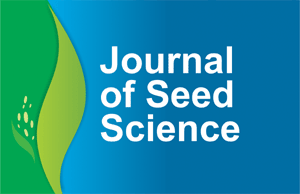Abstract:
The physiological quality of seeds used in agricultural production is one of the main factors that should be considered when implanting the culture. This study aimed at evaluating the quality of bur gherkin seeds, cv. Liso de Calcutá, coming from plants grown from seeds that were previously treated with biostimulant (0, 5, 10, 15 and 20 mL. kg-1 seeds) and cultivated in two irrigation water salinities (0.5 and 3.5 dS. m-1). Initially, the water content of seeds was determined and the following tests were performed: germination, accelerated aging, greenhouse emergence, emergence speed index, height and dry mass of seedling aerial part. It was found that the physiological quality of bur gherkin seeds coming from plants that were subjected to salt stress is negatively affected, and that the use of biostimulant, applied via seeds, provides beneficial effects on the physiological quality of seeds produced in the next generation.
Index terms:
Cucumis anguria; salinity; bioregulator; vigor

 Thumbnail
Thumbnail


